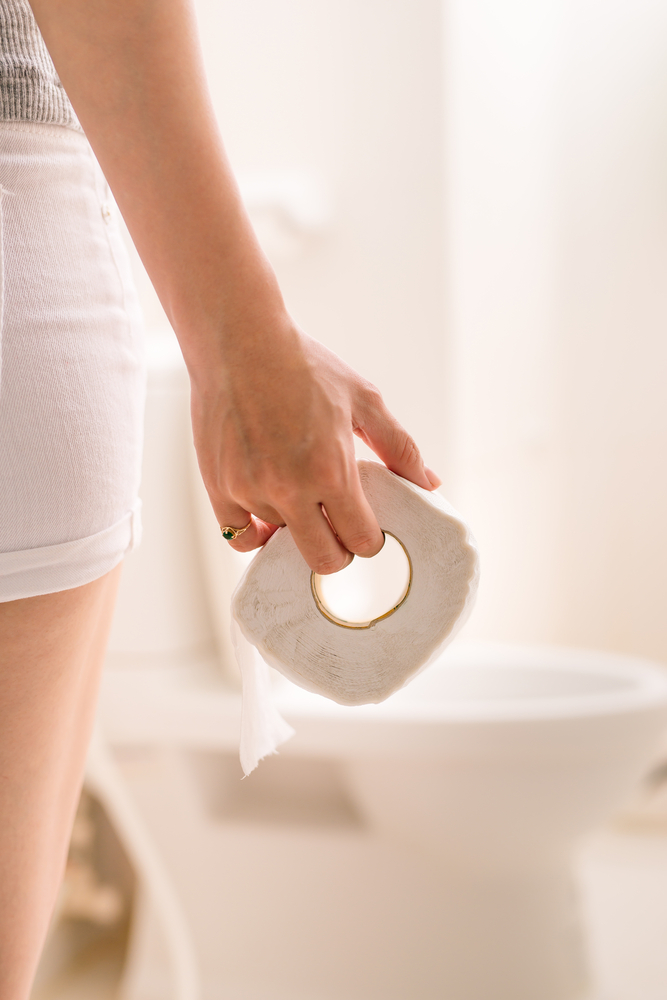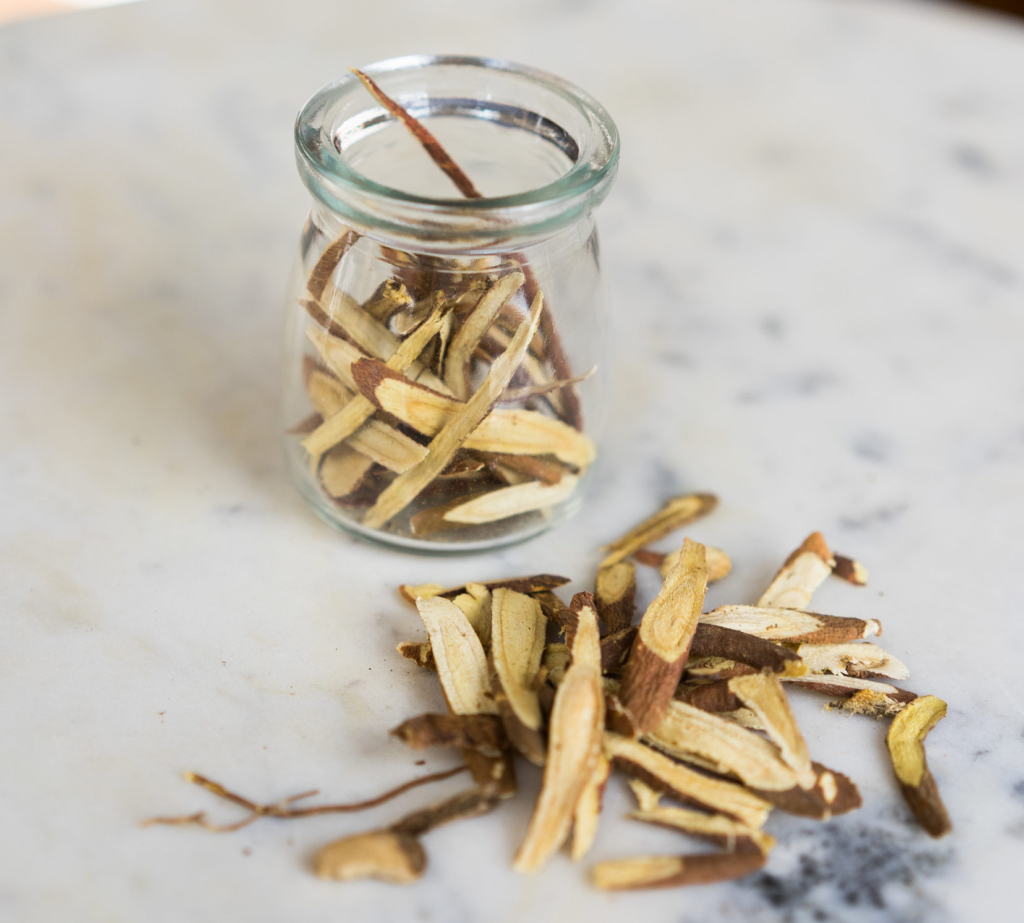3 NATURAL WAYS TO FIX CONSTIPATION WITH EASTERN MEDICINE–FAST!
Easy Tips & Tricks to Help Get You Back on Track

There’s no point in beating around the bush–if you’re reading this article, you’re probably constipated right now or have been recently.
If you’re having a hard time pooping, you’re not alone. In fact, 2 out of 10 Americans deal with this tricky situation every year. So while it may not be the most glamorous of problems, it’s pretty common.
Whether you’re looking for fast relief or want to understand more about chronic constipation, you’re in the right place. If Western medicine hasn’t helped you get (and keep) things moving, try this.
What Is Constipation?
Normally, most people poop anywhere from a few times a day to a few times a week. There’s no set number of times you should sit on the porcelain throne, because it depends on a lot of different things, like your age, weight, diet, and health condition.
So how do you know when you have a pooping problem?
 When you’re struggling and straining to poop and you notice a big change in your typical number of visits to the restroom, that’s a good indication that something isn’t right. Pooping might be painful, and your feces might end up very hard and dry. You’ll probably have other symptoms, too, like gassiness, painful bloating, and feeling the constant need to poop. And if you’re one of the unlucky folks who deal with chronic constipation, you might even end up with painful hemorrhoids.
When you’re struggling and straining to poop and you notice a big change in your typical number of visits to the restroom, that’s a good indication that something isn’t right. Pooping might be painful, and your feces might end up very hard and dry. You’ll probably have other symptoms, too, like gassiness, painful bloating, and feeling the constant need to poop. And if you’re one of the unlucky folks who deal with chronic constipation, you might even end up with painful hemorrhoids.
What Causes Constipation?
Western Medicine
When it comes to western medicine, constipation is usually caused by one of two things: not getting enough fiber in your diet and not drinking enough water. But sometimes it can be a result of things like too much stress, PMS, and issues like IBS. Some medicines like antihistamines, iron supplements, opioid painkillers, and some antidepressants can cause constipation, too.
On the other hand, Eastern medicine understands constipation as a problem with energy or Qi flow. When our internal energy levels are low, our digestive system can do its job very well, and we end up with pooping problems. It can also be the result of issues with the Spleen and Stomach, the major organs that deal with digestion in TCM.
Eastern Medicine
 Most TCM practitioners divide constipation up into 5 different types, each with their own causes and symptoms. They are:
Most TCM practitioners divide constipation up into 5 different types, each with their own causes and symptoms. They are:
-
- Too much heat in the digestive system. Symptoms include irritability, a red tongue with yellow coating, and excessive thirst.
- Stagnant Qi. You might have a stomach ache, low appetite, and a coated tongue. You’ll also probably be burping a lot.
- Insufficient Qi. If you’re constipated because of this, you might notice that your tongue is pale and has a white coating, that you feel especially tired, or you sweat very easily.
- Insufficient blood. With this, you’ll notice that you’re very pale, can’t sleep, and have trouble remembering things.
- Insufficient yin. Symptoms include small, dry poops that look like pebbles, a red tongue, and dizziness.
- Insufficient yang. With this, your symptoms may be stomach aches, lower body pain, and paleness.
If you consult a TCM practitioner about your constipation, be ready to answer all their questions, including what it feels like when you try to poop, the consistency, color, and smell of your poops, and when your constipation tends to strike.
Ayurveda
The Ayurvedic medical tradition considered constipation to be a problem with the vata dosha, one of the three energy types we have in our bodies. Vata controls movement and detoxification, so anything that aggravates your vata dosha can cause constipation. That includes:
- Anxiety and stress
- Travel
- Not drinking enough water
- Cold wind
- Overexerting yourself
- Dry, cold, and rough foods
3 Eastern Medicine Remedies To Help You Poop
Herbal Remedies for Constipation

While western medical tradition relies on pills and prescriptions to make you feel better, eastern medicine practitioners often turn to herbs as part of a natural remedy to disorders and illnesses. When it comes to constipation, there are plenty of herbs in the TCM tradition to help move things along. However, the right herbs for you depend on the cause of your constipation. For example, if you have excess heat, rhubarb is a cooling food with plenty of fiber. If you’re dealing with low levels of Qi or blood, try black sesame seeds. Their natural oils lubricate your intestines, making it easier to poop. All you need to do is sprinkle them on top of a stir fry or avocado toast! And if the problem seems to be with your Spleen or Stomach, Chinese licorice is a popular remedy.
Ayurveda has a different herbal approach to constipation. Since difficulty defecating is the result of a vata imbalance, the three best herbs for constipation relief are:
- Triphala: This is a combo of 3 different fruits–Amla, Bibhitaki, and Haritaki. Drink it with warm water as a tea just after you wake up and right before you go to bed. It’s anti-inflammatory and has long been used to naturally encourage the bowels to move..
- Psyllium: Psyllium is the husk of seeds that soaks up all the water in your gut, making it much easier to poop. It’s a prebiotic, so it’s great for digestion.
- Flaxseed: This is another great herbal laxative. You can eat one tablespoon at a time followed by 2 cups of water, 2-3 times a day.
If you’re unsure which solution is right for you, set up a virtual consultation with one of our Eastern medicine experts and they’ll help create a custom plan for you.
DIY Acupressure
 Acupressure, sometimes called acupuncture without the needles, is an easy DIY way to deal with lots of disorders and illnesses in TCM. Our bodies work together as one harmonious machine, so stimulating a point on the wrist can actually have an effect on the bowels, strangely enough. Here are 2 DIY acupressure techniques to help get your bowels moving.
Acupressure, sometimes called acupuncture without the needles, is an easy DIY way to deal with lots of disorders and illnesses in TCM. Our bodies work together as one harmonious machine, so stimulating a point on the wrist can actually have an effect on the bowels, strangely enough. Here are 2 DIY acupressure techniques to help get your bowels moving.
- Zhi Gou Point: Lay your hand, palm-down on a table. Place the 4 fingers on your other hand on your wrist. Press down where your pointer finger is and look for the indentation between the 2 bones. Massage this spot for 2 minutes a day or when you’re on the toilet, and you should notice that your bowels are stimulated.
- Tummy Rub: This one is really easy. Lie down on your back and put one hand above your belly button and the other on top of the first hand. Move your hands together in a clockwise circle around your belly button 36 times. You can also massage the spots 3 fingers away from your belly button on either side to help get your intestines moving.
Stretch It Out
Often, chronic constipation is the result of holding tension and trauma in the lower body. If you’re constantly struggling on the porcelain throne, yoga and stretches like agni sara, twists, and forward bends, can help move the stagnant energy in your colon and pelvis.
When we have too much vata dosha, the downward energy (called apana vayu) that helps our digestion gets interrupted. To fix that, try inverted yoga postures. Some popular ones are:
- Downward facing dog
- Forward fold
- Crow pose
- Legs up on the wall
These inverted poses should help flip your energy flow, wake up your digestive system, and get your digestive organs back in place.
Now that you have these tips and tricks to help with constipation, relief is on the way. Try them out and you’ll be the king or queen of the porcelain throne again in no time.
Newer
Food As Medicine: The Natures and Flavors of Food According to TCM
Older
5 Eastern Medicine Treatments for PMS
Comments (0)
Leave a reply
You must be logged in to post a comment.




